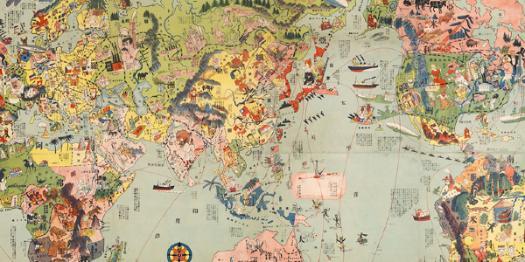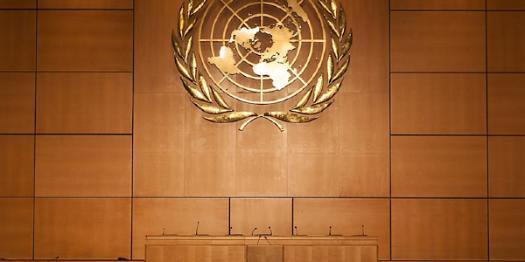Foundational Courses
 Cultivate your global citizenship through the social and cultural foundations of International Studies. Apply an interdisciplinary set of concepts and theories to diversely globalized situations; you'll develop your reflexive practices, interpersonal skills, and problem-solving aptitude across boundaries and differences; and you'll also become better prepared for study abroad and further coursework in the major.
Cultivate your global citizenship through the social and cultural foundations of International Studies. Apply an interdisciplinary set of concepts and theories to diversely globalized situations; you'll develop your reflexive practices, interpersonal skills, and problem-solving aptitude across boundaries and differences; and you'll also become better prepared for study abroad and further coursework in the major.
 Although map literacy is important, understanding world geography is more than simply memorizing a map! This course focuses on comprehension of geographical concepts and critical analysis of regional patterns and issues. We address important social, economic and environmental questions by exploring how geography can help us understand human-environment relations, political and economic processes, population dynamics, social discrimination, and other development concerns throughout the world.
Although map literacy is important, understanding world geography is more than simply memorizing a map! This course focuses on comprehension of geographical concepts and critical analysis of regional patterns and issues. We address important social, economic and environmental questions by exploring how geography can help us understand human-environment relations, political and economic processes, population dynamics, social discrimination, and other development concerns throughout the world.
 Focuses specifically on problems of data collection, comparative analysis, and interpretation that are part of the discipline generally. Will be practiced here within the context of world history.
Focuses specifically on problems of data collection, comparative analysis, and interpretation that are part of the discipline generally. Will be practiced here within the context of world history.
 The study of politics and society using a scientific method of comparison and contrast. This course will introduce you to the comparative method, which presents a rich variety of possibilities to understand real-world phenomena. Throughout the course you will explore the political institutions and processes of countries around the world; understand the dynamics of regime stability and change; investigate the relationship between gender and politics; learn about social movements; become familiar with basic debates on political economy; and develop a deeper understanding of conflict, violence, and peace.
The study of politics and society using a scientific method of comparison and contrast. This course will introduce you to the comparative method, which presents a rich variety of possibilities to understand real-world phenomena. Throughout the course you will explore the political institutions and processes of countries around the world; understand the dynamics of regime stability and change; investigate the relationship between gender and politics; learn about social movements; become familiar with basic debates on political economy; and develop a deeper understanding of conflict, violence, and peace.
 In this introductory course, we will survey the essential concepts, principles, and theoretical perspectives of contemporary international politics, with a focus on the roles and interactions between the state and non-state actors regarding foreign policy making, international conflict and war, international organization and law, and international political economy. We also will seek a better understanding of some of the most pressing global issues concerning both national and human security.
In this introductory course, we will survey the essential concepts, principles, and theoretical perspectives of contemporary international politics, with a focus on the roles and interactions between the state and non-state actors regarding foreign policy making, international conflict and war, international organization and law, and international political economy. We also will seek a better understanding of some of the most pressing global issues concerning both national and human security.
 In this course we analyze how our economy works, how is it organized and its financial and socio-political settings. We study critical economic problems that nations face including unemployment, inflation, public debt, taxation, among others.
In this course we analyze how our economy works, how is it organized and its financial and socio-political settings. We study critical economic problems that nations face including unemployment, inflation, public debt, taxation, among others.
Professional Formation Courses
 The foreign language programs in Chinese, French, Japanese and Spanish recognize academic, cultural, and practical purposes.
The foreign language programs in Chinese, French, Japanese and Spanish recognize academic, cultural, and practical purposes.
Academic
Foreign language study aims at broadening the scope of the student's intellectual development by affording both a facility in foreign languages and knowledge of other cultures.
Cultural
Learning about another culture and civilization—its history, geography, literature, and art—through the medium of its language leads to a better understanding of one's self and the world in which we live. To achieve this goal, all foreign languages are taught in their cultural context. Courses in Chinese, French, Italian, Japanese, and Spanish are taught in the vernacular.
Practical
Career opportunities involving foreign languages are expanding. For the university graduate with a specialization in a particular field and with proficiency in foreign languages, openings exist in the following fields: engineering, foreign trade, foreign service, international business, international law, librarianship, military, social work, teaching, tourism industry, and transportation. In addition, many graduate programs require proficiency in foreign language.
Go to the Program Finder to learn more about languages at Seattle University.
 The ability to gather, analyze and read data is fundamental. This course provides you with a theoretical framework and experiences applying qualitative and quantitative research methods and analyzing data in a global and transdisciplinary fashion.
The ability to gather, analyze and read data is fundamental. This course provides you with a theoretical framework and experiences applying qualitative and quantitative research methods and analyzing data in a global and transdisciplinary fashion.
 Congratulations! Through hard work and self-discipline, and with the assistance of friends, family and faculty, you have reached the culmination of your Seattle University education. Your training as an International Studies major at Seattle University has put great emphasis on the interdisciplinary knowledge, skills and tools you will need to understand, engage in, and make a positive contribution to an increasingly globalized, diverse, and complex world. Now is time for you to step up and apply these skills.
Congratulations! Through hard work and self-discipline, and with the assistance of friends, family and faculty, you have reached the culmination of your Seattle University education. Your training as an International Studies major at Seattle University has put great emphasis on the interdisciplinary knowledge, skills and tools you will need to understand, engage in, and make a positive contribution to an increasingly globalized, diverse, and complex world. Now is time for you to step up and apply these skills.
The Senior Capstone course provides you an opportunity to:
- Reflect on what you have learned over the course of your college education.
- Consider the concepts, skills, and tools developed and sharpened during your college experience.
- Apply those concepts and skills to study an important conceptual or policy problem related to your major.